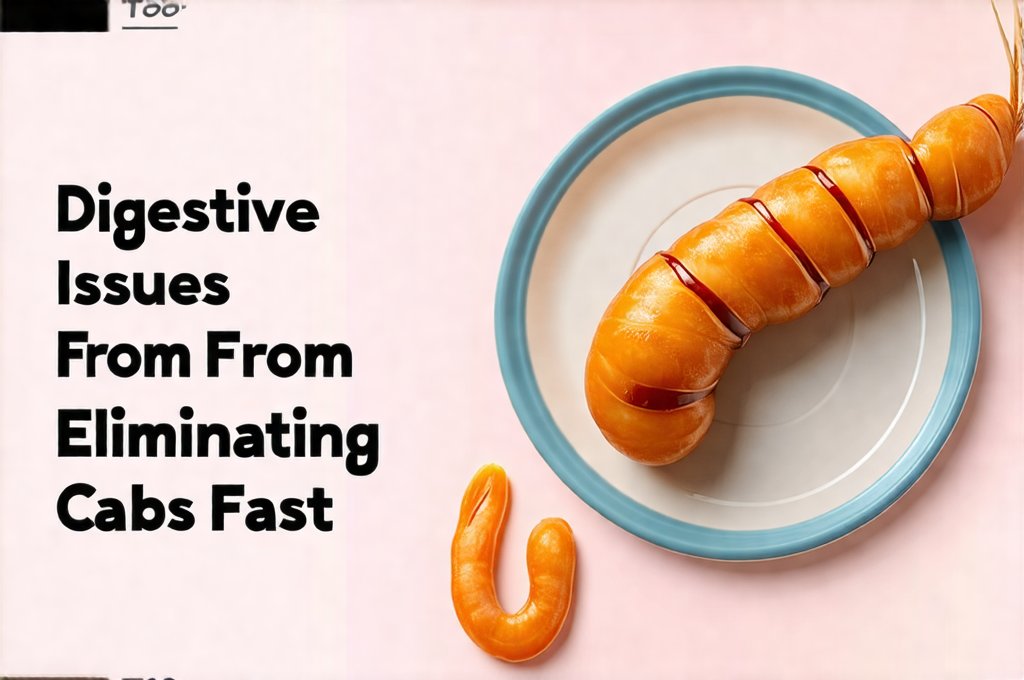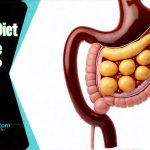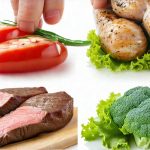The allure of rapid weight loss often drives people toward extreme dietary changes, with carbohydrate elimination being a particularly popular strategy. While reducing carb intake can be beneficial for some, doing so too quickly frequently leads to a cascade of unpleasant and even concerning digestive issues. Many individuals embarking on low-carb or keto diets underestimate the profound impact carbohydrates have on gut health and overall digestive function. The sudden removal of this macronutrient isn’t simply about cutting calories; it’s fundamentally altering the ecosystem within your digestive system, often with unexpected consequences. It’s crucial to understand that a healthy digestive tract relies on a delicate balance, and abrupt dietary shifts can disrupt this harmony, leading to symptoms ranging from mild discomfort to significant distress. Understanding digestive issues is the first step toward managing your gut health.
The human body is remarkably adaptable, but adaptation requires time. When carbohydrates are drastically reduced, the digestive system—accustomed to processing them—struggles to adjust. This isn’t just about missing the energy source; it’s about the fiber content often associated with carbohydrate-rich foods, the role carbs play in maintaining gut bacteria populations, and how they influence motility (the movement of food through your digestive tract). Ignoring these factors can lead to a frustrating experience, potentially derailing even the most motivated dieter. Recognizing the potential pitfalls before drastically altering your diet is key to minimizing discomfort and maximizing success – not just in terms of weight management but also overall health and well-being. Consider how breath tests can help you understand your digestive system.
The Fiber Fallout: A Gut Microbiome Disruption
Fiber is a cornerstone of healthy digestion, and many carbohydrate sources are rich in it. When carbs are swiftly eliminated, fiber intake often plummets as well. This sudden deficiency has far-reaching effects. – Reduced stool bulk leads to constipation, which can be uncomfortable and contribute to bloating. – The gut microbiome, the community of trillions of bacteria residing in our digestive system, relies on fiber for sustenance. A lack of fiber effectively starves beneficial bacteria populations, allowing less desirable species to proliferate. This imbalance, known as dysbiosis, can manifest in a variety of ways, including increased gas, bloating, and even altered mood due to the gut-brain connection. – The absence of fermentation products from fiber breakdown (short-chain fatty acids) impacts colon health and immune function. These compounds are vital for maintaining the integrity of the intestinal lining.
Furthermore, different types of fiber feed different bacteria. Suddenly switching to a very low-carb diet often means eliminating diverse fiber sources, further narrowing the food supply for your gut microbiome and exacerbating dysbiosis. Many people attempting rapid carb elimination replace carbs with increased fat and protein intake without adequately compensating with fibrous vegetables or low-carb fiber supplements. This can amplify digestive problems because the body isn’t accustomed to processing such large amounts of fat and protein without sufficient fiber to aid in digestion and absorption. It’s not enough simply to cut carbs; you must consciously replace them with nutrient-dense, fiber-rich alternatives (within your chosen dietary framework) if you want to maintain a healthy gut. Tracking digestive data can help you understand how your body is reacting.
A gradual reduction in carbohydrate intake is generally far more manageable for the digestive system. Instead of eliminating all carbs at once, consider starting by reducing refined carbohydrates and sugary drinks, then slowly decreasing complex carb portions over several weeks. This allows the gut microbiome time to adapt and minimizes the shock to your digestive system. Paying attention to individual tolerance levels is also vital; some people can handle faster transitions than others.
Constipation and Its Complications
Constipation is arguably the most common digestive complaint associated with rapid carb elimination. As mentioned, fiber plays a crucial role in regulating bowel movements. Without enough fiber, stools become hard and difficult to pass, leading to straining and discomfort. This isn’t merely an inconvenience; chronic constipation can have serious health implications. – It may contribute to hemorrhoids and anal fissures. – Prolonged exposure of the colon to stagnant waste increases the risk of developing polyps or even colorectal cancer. – Constipation can also exacerbate symptoms of irritable bowel syndrome (IBS) in susceptible individuals.
Beyond fiber, adequate hydration is essential for preventing constipation. Many people mistakenly believe that simply eating more fiber will solve the problem, but without sufficient water intake, fiber can actually worsen constipation by forming a bulky mass that’s difficult to move through the digestive tract. Aiming for at least eight glasses of water per day is generally recommended, though individual needs may vary depending on activity level and climate. Consider incorporating natural laxatives like prunes or flaxseeds (in moderation) if needed, but always prioritize fiber-rich foods and sufficient hydration as your first line of defense. It’s important to know when digestive issues warrant more investigation.
Finally, physical activity can significantly improve bowel regularity. Regular exercise stimulates intestinal muscles, promoting peristalsis (the wave-like contractions that move food through the digestive tract). Even a short walk each day can make a noticeable difference in preventing constipation and maintaining healthy digestion. It’s also important to listen to your body’s signals and avoid suppressing the urge to defecate; doing so can weaken bowel muscles over time.
Bloating, Gas, and Abdominal Discomfort
The rapid shift in gut bacteria composition caused by carb elimination often leads to increased gas production and bloating. When beneficial bacteria are starved due to lack of fiber, less desirable bacteria thrive, producing more gas as a byproduct of their fermentation processes. This can result in uncomfortable bloating, flatulence, and abdominal cramping. – Certain low-carb foods, like cruciferous vegetables (broccoli, cauliflower, cabbage) can also contribute to gas production, especially if you’re not accustomed to eating them regularly. – The sudden increase in fat intake often associated with low-carb diets can slow down digestion, giving bacteria more time to ferment food and produce gas.
Managing these symptoms requires a multi-faceted approach. Probiotic supplementation may help restore the balance of gut bacteria, but it’s important to choose a high-quality probiotic containing strains known to support digestive health. Fermented foods like yogurt (unsweetened), kefir, or sauerkraut can also provide beneficial probiotics. Peppermint tea and ginger have been shown to relieve bloating and gas in some individuals. However, avoid relying solely on quick fixes; addressing the underlying cause – fiber deficiency and gut dysbiosis – is crucial for long-term relief. Understanding how digestive enzymes can help may also be useful.
Additionally, mindful eating practices can help minimize digestive discomfort. Eating slowly and chewing food thoroughly aids digestion and reduces the amount of air swallowed during meals. Identifying and avoiding trigger foods that exacerbate bloating or gas production is also important. Keeping a food diary can help you pinpoint these problematic foods and make informed dietary adjustments.
Diarrhea as an Unexpected Consequence
While constipation often receives more attention, diarrhea can also occur when carbs are eliminated too quickly. This may seem counterintuitive, but it’s a common response to the sudden change in digestive processes. – The increased intake of fats, particularly if not accustomed to it, can overwhelm the gallbladder and lead to malabsorption, resulting in loose stools. – Some artificial sweeteners commonly used in low-carb products (sugar alcohols like erythritol or xylitol) have a laxative effect in many people. – A rapid shift in gut bacteria composition can also disrupt intestinal permeability, leading to diarrhea. The lining of the intestines becomes more porous and allows fluids to leak into the bowel.
If you experience diarrhea after eliminating carbs, it’s essential to reassess your diet and identify potential triggers. Reducing fat intake temporarily may help alleviate symptoms. Carefully review ingredient lists on low-carb products and avoid those containing excessive amounts of sugar alcohols. Staying well-hydrated is paramount during episodes of diarrhea to prevent dehydration. If the diarrhea persists or becomes severe, it’s important to consult a healthcare professional to rule out other underlying causes. Consider how digestive enzyme tests can help diagnose the root cause of digestive issues.
Ultimately, minimizing digestive issues when eliminating carbs requires a thoughtful and gradual approach. It’s not about drastic restrictions; it’s about making informed choices that support your gut health and overall well-being. Remember: slow and steady wins the race – both in terms of weight management and digestive comfort. Also consider what to avoid when grocery shopping for optimal gut health.


















